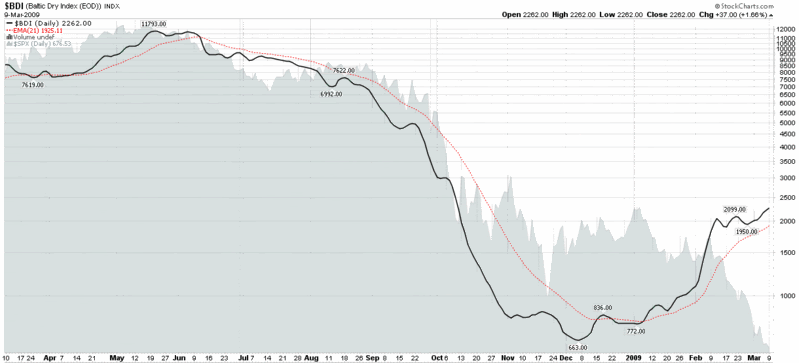Rising Baltic Dry Index a Sign of a Commodities Bottom?
On the last day of 2008, I urged readers to Watch the Baltic Dry Index in 2009 for clues about the strength of global trade.
To quickly recap, the Baltic Dry Index (BDI) measures shipping rates for dry bulk carriers that carry commodities such as coal, iron and other ores, cocoa, grains, phosphates, fertilizers, animal feeds, etc.
While I have previously chronicled the dramatic drop in production in several of the world’s most important export economies, according to the Baltic Dry Index, shipping rates started moving up in December and have turned up sharply in the past six weeks. Since the beginning of the year, crude oil and copper prices have begun to firm and commodities in general have been outperforming on a relative basis. To be fair, some of the bullish action in commodities has been due to expectations about an increase in the proposed Chinese stimulus package. Given that recent announcements from Beijing have disappointed those looking for new stimulus measures, however, one now has to consider that the BDI and commodity prices have been able to extend their recent gains without the help of increased government spending plans. This development raises the possibility that commodities may indeed be in the process of bottoming.

[source: StockCharts]


5 comments:
Trader reports say that the most likely cause for the rise in the Baltic Dry is that China is stockpiling large reserves of various bulk commodities, to lock-in current low prices.
This stockpiling requires a bit more transport ship capacity, so the bulk carrier shipping rate rises.
(BTW, the most recent data shows that the index is coming down slightly again).
So, I'm afraid the rise is NOT caused by an uptick in general world economic health, but rather by China taking advantage of depressed conditions to hedge its resource reserves.
Note that the BDI is quite sensitive to changes in the price of crude oil. Fuel and port-related charges are significantly large components of the total cost of maritime shipping.
Although port-related expenses such as dockage charges are relatively stable, oil prices are notoriously volatile.
As a result, this index is sensitive not only to changes in the demand for raw materials, but also to oil price changes.
A signicant BDI rise may therefore also purely be the result of an oil price rise, and not per se a rise in demand for bulk commodities.
Not to quibble, but isn't "taking advantage of depressed conditions" the first step in a recovery phase. I mean, it doesn't go from Depression to exponential growth at the flip of a switch.
And isn't a rise in the price of oil some sort of signal that demand is not collapsing even further? I mean, if supply was shrinking via OPEC, and demand was also shrinking, would oil prices be rising? My guess is that demand is holding steady and supply is shrinking. While that's not growth, it is stability, at least from a demand perspective.
My point is, although I have no opinion on the direction of commodity prices myself, take heed in dismissing the rise in BDI as purely technical.
As soon as China has topped up its commodities reserves, we'll likely see BDI come down again.
And oil is probably up on technical factors, not on a healthier outlook for the world economy.
Bill, an interesting observation on BDI that I read somewhere recently. I have no means of validating it but the argument goes something like:
Beware of upticks in BDI on shorter timeframes meaning a few months at least. Because the BDI only measures lease rates for boats that are in use not the actual volume of trade. One can infer from an uptick that there is some increase in trade but the volume increase could be quite modest. Recently many boats have been taken off the market and it will require a sustained new level in the BDI to bring them back. So the BDI is not a real-time, day-to-day indicator of world economic health.
Post a Comment